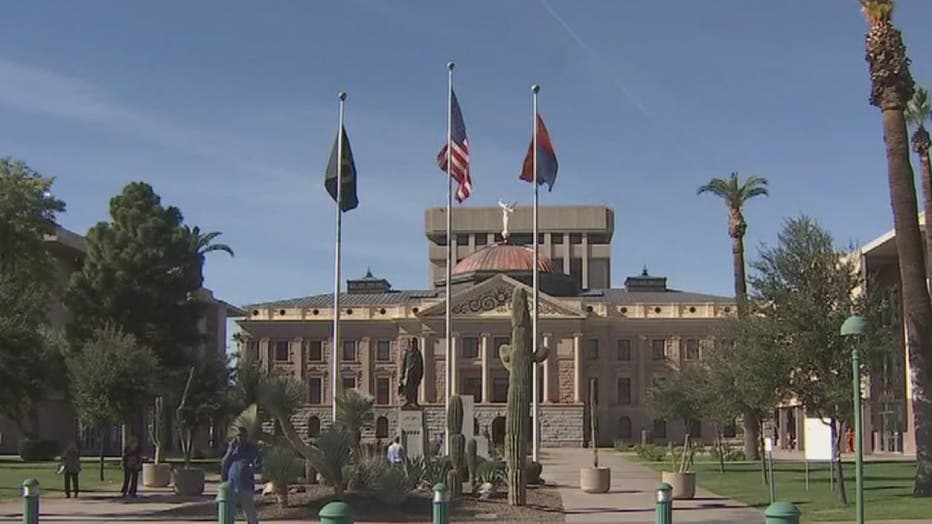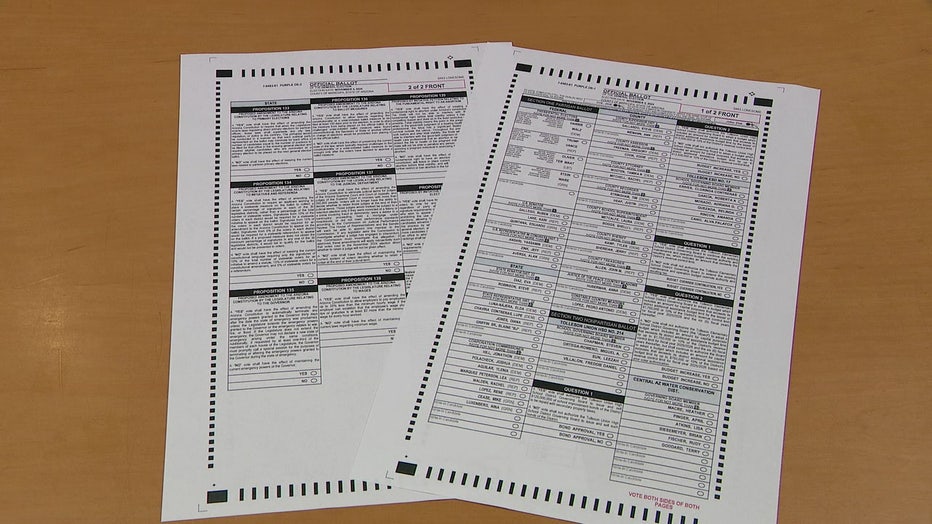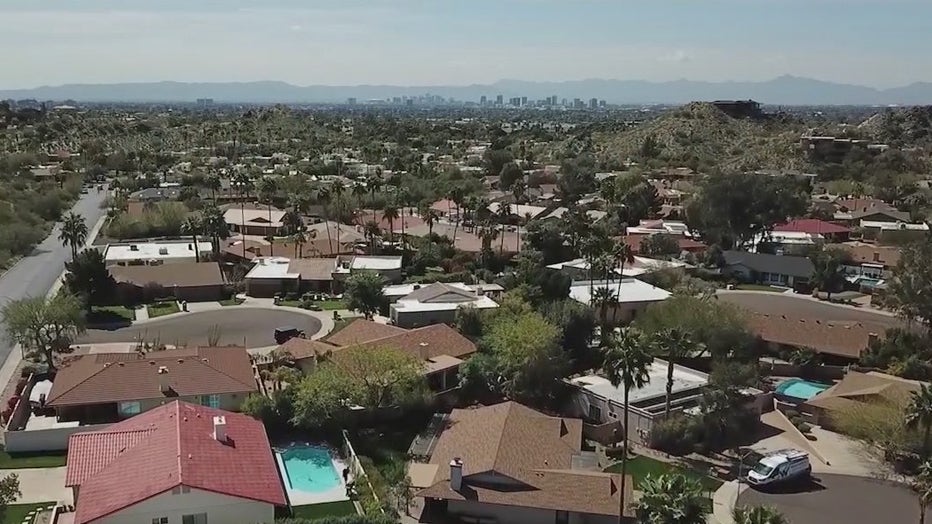Arizona ballot propositions: A look at other ballot measures this November | 2024 Election
PHOENIX - While there are ballot propositions that deal with hot-button issues like abortion and illegal immigration, there are also a number of measures on issues that receive less attention.
Here's a look at those ballot measures.
Proposition 135 - Governor's emergency powers

Arizona Legislature (From File)
The measure would amend the Arizona State Constitution regarding the governor's emergency powers.
Per the publicity pamphlet for this year's election, Prop 135 would specify that the emergency powers granted to the state's governor during a state of emergency, except for "powers related to a state of war emergency or an emergency arising from a flood or fire," would terminate 30 days after the state of emergency was proclaimed, unless the state legislature extends the emergency powers via a concurrent resolution.
"If the Legislature extends the Governor's emergency powers, the Legislature would be allowed to alter or limit the powers by concurrent resolution. If the Legislature does not extend the Governor's emergency powers, the Governor would be prohibited from proclaiming a new state of emergency arising out of the same conditions for which the initial state of emergency was proclaimed," read a portion of the analysis for Prop 135.
The analysis for this measure states that currently, Arizona's governor is allowed to declare a state emergency "if the Governor finds that a disaster or other extreme peril threatens the safety of the people or property of this state."
Some supporters say the measure would ensure proper oversight of the governor's powers, and say small businesses will benefit.
"Prop 135 would provide for the branch of government closest to the people - the legislative - to hold the Governor accountable, ensuring the power is in more than one person’s hands. This is especially important for individuals and businesses that don't have political influence or resources, such as small businesses who are unable to challenge the government’s overreach," wrote Patricia Moore of Goodyear.
Opponents, meanwhile, say the measure could delay emergency responses in Arizona.
"The purpose of any state emergency declaration is to allow state agencies to implement reasonable measures to help quickly respond to disasters," wrote Arizona Public Health Association Executive Director Will Humble. "Without the governor having that extra temporary statutory authority during a public health emergency, we’re in danger of losing the ability to quickly respond. And when people and communities are in a state of emergency, the last thing they need to do is wait for the legislature to come to a consensus."
Proposition 136 - Allowing legal challenges to ballot measures before the election

(From File)
According to the proposition's analysis, it will amend the state's constitution and allow a person to challenge a ballot measure's constitutionality at least 100 days before the day when voters will decide on the measure or measures in question.
"Any party may appeal the superior court's decision to the Arizona Supreme Court within five days after the superior court enters judgment," read a portion of the analysis. "If a court finds that the proposed statutory initiative measure or proposed constitutional amendment violates the United States Constitution or Arizona Constitution, the Secretary of State or other officer shall not certify or print the measure or amendment on the official ballot."
The analysis states that currently, the courts "generally may not adjudicate challenges to the constitutionality of an initiative measure until after the initiative measure is enacted by the voters."
In the pamphlet, there was only one argument submitted in support of the measure.
"Prop 136 would protect our election process from these unconstitutional measures by allowing the Arizona Supreme Court to review a proposed initiative before it goes on the ballot," wrote Arizona Free Enterprise Club President Scot Mussi. "This is a simple, common-sense reform that ensures that unconstitutional measures are not placed on the ballot."
Opponents, meanwhile, say the measure would create more burdens for citizens who propose a ballot measure.
"Prop 136 would allow any person to challenge the constitutionality of any constitutional amendment or ballot initiative measure as soon as they are filed with the state," wrote Bob Sommer of Tempe. "Without any clear benefits, this measure only makes the initiative process more expensive, time-consuming, and confusing for Arizonans who want to exercise this essential democratic right."
Proposition 138 - Tipped Workers Protection Act

(Photo by Spencer Platt/Getty Images)
Per the measure's analysis, Prop 138, also known as the Tipped Workers Protection Act, would amend the state's constitution by adding a provision that regulates pay for tipped workers.
If approved by voters, the analysis states that an employer will be permitted to pay up to 25% per hour less than the minimum wage for employees who customarily and regularly receive tips or gratuities. However, the employer will need to establish that the employee in question is paid at least the minimum wage plus $2 per hour, for all hours worked.
"This calculation is determined by averaging the employee's tips or gratuities received and wages paid over the course of the employer's payroll period or any other period that complies with state law. The employer would be able to use the employer's records of charged tips or gratuities or the employee's FICA declaration to establish compliance," read a portion of the analysis.
Currently, the analysis states that employers can pay tipped employees up to $3 less than minimum wage, when it is established that when adding tips or gratuities to wages, the tipped workers was paid at least the minimum wage for all hours worked.
Supporters say the measure will help restaurants.
"The Tipped Workers Protection Act (TWPA) is essential for keeping our heads above water and for protecting our employees’ incomes. By preserving the tip credit and adding an extra $2 per hour in guarantees for tipped employees, the TWPA helps us manage costs effectively and provide great customer service," wrote Grant Krueger. In his argument, he stated that he owns Union Public House in Tucson. "Without this, we’d be forced to raise prices or add service charges, which not only affects customer turnout but also drives inflation."
Meanwhile, opponents say the measure will have a negative impact on tipped workers.
"Prop 138 will permanently continue the exploitation of tipped workers through a drastic cut in their base minimum wage. The minimum wage is not a livable wage and not all tips are guaranteed or equal depending on the venue of employment," wrote Eric Souders of Flagstaff. "Reducing the minimum wage by 25% for tipped workers will exacerbate the financial insecurity of these workers and contribute to the existing racial and gender discrimination that tipped service jobs come with."
Proposition 311 - Back The Blue Act

(From File)
If approved by voters, the analysis for Prop 311 states the measure would establish a new state law that provides a death benefit of $250,000 for the surviving spouse or children of a first responder "who is killed in the line of duty as the result of another person's criminal act."
"Proposition 311 would establish a $20 penalty fee on every criminal conviction to provide funding for the new state death benefit. The new state death benefit and penalty fee would begin on July 1, 2025. The state death benefit and penalty fee would be repealed on January 1, 2033," read a portion of the analysis.
The analysis also states that the criminal punishment for aggravated assault against peace officers will be increased until Jan. 1, 2033, and first responders will be included in the list of possible victims for the crime.
One supporter said, in their argument for the measure, that the measure will encourage more people to join the ranks of first responders.
"Proposition 311 is a step in the right direction. It tells our first responders that the community has their backs. It protects them directly by increasing penalties on criminals who attack them, and it gives them a little extra peace of mind knowing that their families will be taken care of if the worst were to happen," wrote AZ Law Enforcement Outreach and Support President Cynthia Hill. Her argument is listed as being sponsored by a group called ‘Back The Blue.’
One argument against the measure states that families of first responders who die while on duty should not have to meet their financial needs by relying on those who were convicted of crimes.
"The legislature should fund the full death benefit directly in the state budget as a sign of gratitude to those who risk enduring the ultimate sacrifice. Establishing a line item in the budget to fully fund death benefits for first responders is just the right thing to do," wrote Kurt Neumann of Tucson.
Proposition 312 - Property tax refund

Homes in Phoenix (From File)
The analysis states the measure, if approved by voters, would allow a property owner to apply for a once-per-year refund for "documented, reasonable expenses" incurred for the following reasons:
- Mitigating the effects of a city, town, or county maintaining a public nuisance on the property owner's real property
- Mitigating the effects of a city, town or county adopting and following "a policy, pattern or practice that declines to enforce existing laws prohibiting illegal camping, obstructing a public thoroughfare, loitering, panhandling, urinating or defecating in public, consuming alcoholic beverages in public or possessing or using illegal substances and the property owner incurs documented expenses to mitigate the effects of the policy, pattern, practice or public nuisance on their real property."
Per the analysis, the property owner would need to apply to the Arizona Department of Revenue to start the refund process. If a refund request is rejected, the property owner who applied "would be eligible to file a cause of action for a court to determine whether the property owner is entitled to the refund and whether the amount of the refund is reasonable."
"If the refund amount is more than the amount the property owner paid in primary property taxes on the real property for the prior tax year, the refund for that tax year would be limited to the amount paid in primary property taxes to the city, town or county, and the property owner must reapply in subsequent tax years to receive the remaining balance of the refund," read a portion of the analysis. "Additionally, if a public nuisance or policy, pattern or practice remains in place, the property owner would be eligible to apply for another refund in a subsequent tax year, unless the property owner entered into a settlement with the city, town or county."
The analysis also notes that a property owner who receives a refund would "waive their rights under the Private Property Rights Protection Act, which prohibits a government from taking private property without just compensation," while noting that property owners affected could "pursue other remedies provided in Arizona law, the Arizona Constitution or the United States Constitution."
In addition, the refunds would not apply to "case-by-case, published decisions of city, town or county authorities that exercise prosecutorial discretion not to prosecute alleged offenders, acts of executive clemency, acts or omissions taken during a state of emergency or acts or omissions required by federal law." The measure will last through tax year 2035.
One supporter says the measure would protect the investments business owners make in Arizona.
"Increases in crime means that stores get less foot traffic and often results in both businesses and homeowners having to take on additional security expenses. All while still paying taxes to a city who is failing to protect us or provide the services it promised us. That’s just wrong. People should feel safe knowing that the investment they make in Arizona is protected, regardless of if that is a business or home. Cities need to stop prioritizing the rights of criminals over the rights of law-abiding property owners," wrote Grent Krueger, owner of Union Hospitality Group.
One opponent stated their concerns over the measure's impact on the homeless, as well as its impact on essential local services.
"People experiencing homelessness are our neighbors. Targeting them with police eliminates a homeless individual’s paths to stability, health, gainful employment, and housing opportunities," wrote Fuerte Arts Movement Deputy Director Dominique Medina. "Additionally, this tax giveaway would reward the out-of-state equity firms which created our housing crisis through hoarding homes and inflating rental prices. With 32% of homes on the rental market in Arizona, that is a large chunk of money withheld from stagnating city and state budgets. This tax giveaway would strip cities of support for the homeless, but also our parks, roads, firefighters, and other essential city services."
Proposition 315 - Rulemaking reform

Arizona State Capitol (Joe Sohm/Visions of America/Universal Images Group via Getty Images)
The measure, per its analysis, deals with the process in which state agencies adopt rules.
"Proposition 315 would require a state agency to submit to the Office of Economic Opportunity (OEO) for review a proposed rule that is estimated to increase regulatory costs in Arizona by more than $100,000 within five years after implementation. If OEO finds that the proposed rule is estimated to increase regulatory costs in Arizona by more than $500,000 within five years after implementation, the proposed rule would not become effective until legislation is enacted to ratify the proposed rule," read a portion of the analysis.
The analysis states that the measure will not apply to the Arizona Corporation Commission. In addition, the measure would also allow the following:
- A legislator or a person who is regulated by a state agency that is proposing a rule to request the OEO to review a proposed rule.
- Exemption of any emergency rules from legislative ratification requirements.
- Provide that on the effective date of this measure, any new rule subjected to the regulatory cost review process is declared void and unenforceable until the Legislature ratified the rule.
Currently, the analysis states that a state agency seeking to propose a rule needs to open a rulemaking docket as a way to notify the public of the proposed rulemaking.
"The state agency is required to accept comments on the proposed rule for at least 30 days before submitting the final rule to the Governor’s Regulatory Review Council (GRRC) for approval," read a portion of the analysis. "The Administrative Rules Oversight Committee (AROC) may also review any rulemaking action to ensure conformity with statute and legislative intent. AROC may comment and designate a representative to testify to GRRC on whether the rule is consistent with statute or legislative intent. GRRC is required to consider the comments and testimony
AROC and may review and approve the rule or return the rule."
One supporter states the measure helps protect businesses.
"This act benefits all of us by bringing checks and balances. It makes agency rulemaking consistent with virtually every other government function," wrote Ed Phillips of Phoenix. "With the Legislature involved, you will now have a stronger voice against unfair and onerous regulations."
Opponents, meanwhile, will negatively impact Arizonans.
"Those attacking ‘regulation’ and ‘bureaucracy’ fail to note that such agencies protect us from contaminated food, fraudulent health care claims, predatory lenders, unscrupulous contractors, and so much more. Agencies fill in essential gaps between statute and implementation with a tightly supervised rulemaking process, and trying to smother that with even more red tape and partisan infighting is a fool’s errand," wrote Civic Engagement Beyond Voting Co-Founders Catherine Sigmon and Melinda Iyer.

